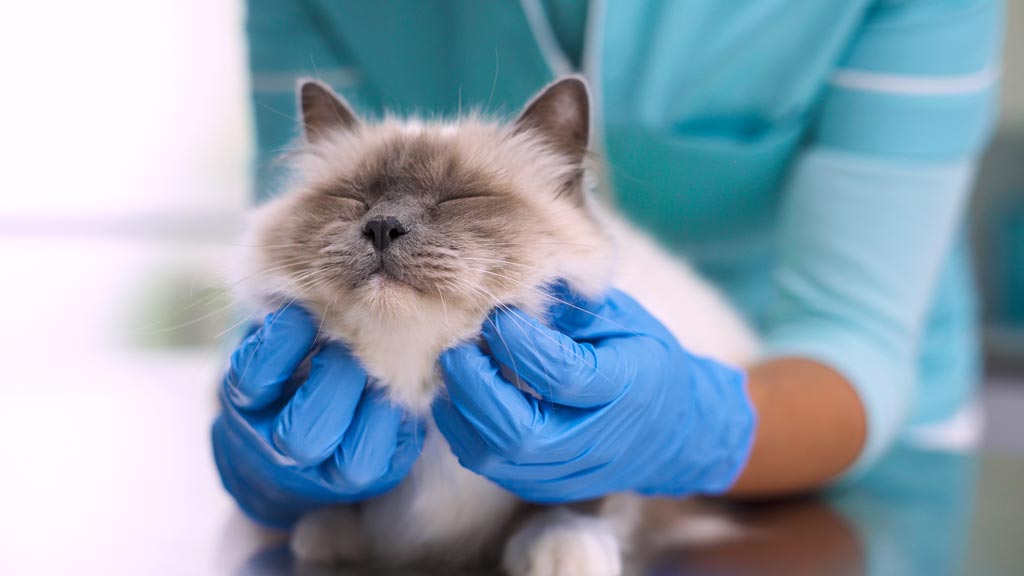FAQ
Does the radioactive injection hurt?
No, it is painless and given under the skin. There is no local skin irritation.
Must I isolate my kitty when she (or he) comes home?
No, however, you cannot hold your cat on your lap for more than a few minutes per day when she first comes home. But she can stay in the room with you as long as she is at least 3 feet away from you.
What is the oldest cat you have treated?
22 years old.
Why does Tapazole (methimazole) make my cat sick?
Some cats may not be able to take Tapazole because of possible side effects such as nausea, skin excoriations, blood dyscrasias, vomiting and malaise.
My cat has diabetes. Can it be treated?
Yes, we have treated many cats that are hyperthyroid and diabetic. We continue their prescribed diet and insulin during hospitalization.
My cat takes vitamin supplements and other medications. Will these interfere with the treatment?
Some can interfere, particularly those containing sea kelp with lots of iodide. These must be discontinued prior to and during treatment.
Most antibiotics do not interfere. Please discuss your cat’s medications and supplements with the staff prior to admission and bring the containers with you at the time of admission.
What must I remember about treatment with radioactive iodine?
- The treatment may not work in 5% to 6% of cats treated with the first injection. Statistically, most of these cats will respond to a second injection if the problem is not a malignant tumor. The Cat Company will offer to treat these cats a 2nd time at a reduced cost.
- Some cats will show a lower than normal thyroid level when rechecked. This is usually not a problem, and very few will require thyroid supplements.
- Although the radioiodine has no serious adverse effects that we know of, it also will not help or cure any underlying diseases that your cat may have not related to hyperthyroidism.
- In most cases, hyperthyroidism artificially lowers your cat’s renal blood values, and these values may increase after treatment of thyroid disease by any means — surgery, medication, or radioiodine. Though treatment does not harm the kidneys, it may merely unmask their true condition.
Your cat will be housed in a quiet, pleasant home-like environment in quiet part of the building. Live entertainment is provided by a troupe of gerbils and birds.
May I visit my cat during the treatment?
No, once your cat has been treated, there can be no visitation except by authorized personnel. You may call us anytime for updates on your pet’s condition.
My cat is hyperthyroid. What does that mean?
The thyroid gland is a butterfly shaped gland that is found just below the larynx (voice box) in front of the trachea (windpipe). It produces thyroid hormones T3 and T4, which are released into the blood stream to maintain body functions like heart rate, breathing, intestinal movement, attitude, sweat glands and overall metabolism. When this gland becomes over-stimulated and releases excessive thyroid hormone, the entire body is affected.
What causes the T3 and T4 levels to increase?
Thyroid levels increase due to a tumor, most often benign, on the thyroid gland. This tumor secretes thyroid hormone and does not respond to the normal signals of the body to stop producing and releasing this hormone in spite of adequate levels.
What are the clinical signs of hyperthyroidism?
Because the entire body can be affected, each patient may manifest their disease differently. The most common signs of hyperthyroidism include:
Increased heart rate or tachyarrhythmia.
Since so many cats are stressed in the office, veterinarians may assume an increased heart rate is caused by the cat’s excitement. But tachyarrhythmia can also arise due to the toxic effects of excess thyroid hormone.
Weight loss
This is the most commonly detected sign of hyperthyroidism. Unfortunately, it’s often not noticed until the patient has lost more then 20% of her original body mass.
Change in appetite
Increases in the cat’s appetite are early signs of hyperthyroidism. A smaller percentage of cats will show a loss of appetite when other organ systems are being affected.
Change in behavior — either more hyperactive or more lethargic
Increased activity, lack of normal sleep habits, playing more aggressively, more irritability than normal, pacing around the house, a wide eyed look — all are early signs of hyperthyroidism. However, as organs systems begin to fail, patients can also be lethargic and sleeping all the time.
Vomiting and Diarrhea
Although these symptoms can arise for a number of reasons, cats with hyperthyroidism frequently exhibit vomiting or diarrhea with no other explanation in sight.
Hair loss
Dry hair, fragile, thinning, or even outright bald spots are some of the main dermatological signs of hyperthyroidism in cats. Older cats with recent changes in skin and hair coat should be screened for hyperthyroidism.
Increased Respiratory Rate
Excess thyroid hormone can cause subtly increased rates of respiration with no stress or physical excretion.
Fever
Some hyperthyroid patients present with a low to moderate grade fever with no evidence of sepsis or necrosis.
Vocalization changes
Owners of hyperthyroid cats will frequently say that their pet is either vocalizing more or has changed the tone of their meows or cries, especially at night.
I think my cat is hyperthyroid, what tests should be done?
A total T4 test, or simply a T4.
What if the screening tests are inconclusive, what other test are available to evaluate my cat’s thyroid status?
Other tests would be up to your veterinarian’s judgment, but may include a Free T4 by equilibrium dialysis, or T3 suppression test.
What about thyroid scintigraphy? Is it necessary for appropriate diagnosis and treatment of hyperthyroidism?
No. While it can be helpful for unclear or occult cases of hyperthyroidism, thyroid scintigraphy is typically not necessary for diagnosis or treatment of the disease.
What is the treatment for hyperthyroidism?
There are three most common treatment options. Here are the advantages and disadvantages of each:
| Tapazole
Advantages
Disadvantages
|
Surgery
Advantages
Disadvantages
|
I-131 Therapy
Advantages
Disadvantages
|
Are there any contraindications to treating hyperthyroidism?
The most significant concern is unmasking underlying renal disease. Although unlikely, this is a potential side effect with any treatment option.
What is the effect of hyperthyroidism treatment on renal disease?
Treating hyperthyroidism has no adverse effect on the kidney. What we do see is that hyperthyroidism artificially lowers the renal blood values used to determine the status of renal disease. Once the thyroid disease is cured by any of the three common treatments, the blood values are no longer artificially depressed and give a more accurate measurement of the cat’s renal status.
Can renal disease be prevented?
Although not totally preventable, there are some precautions that can be taken prior to treatment that will decrease the incidence of renal disease. This includes a thorough evaluation of the kidneys including blood work and a urinalysis and a tapazole trial
What if my cat shows renal signs prior to treatment?
Some hyperthyroid patients with renal disease can be placed on a low dose of tapazole that may help with the clinical signs, but not totally control the hyperthyroidism. Sometimes it is better to achieve a balance in a patient in renal disease with some degree of hyperthyroidism.
Are there any precautions that I must take after my cat has radioactive iodine therapy?
We will give you detailed instructions at the time of release. Any person in the household under 18, pregnant or trying to get pregnant should limit their interaction with the cat for the first 2 weeks (especially the urine and feces). The precautions are common sense but are also mandated by the Nuclear Regulatory Commission.
Are there any post-treatment concerns with radioactive iodine therapy?
Some cats exhibit signs of a sore throat for a day or two, which may manifest as transient change of voice or reluctance to eat.
If the post treatment thyroid level is low to low normal, do I need to give thyroid supplementation?
Some cats will show a laboratory value indicating a low thyroid level following treatment. In most cases this in not significant and does not require supplementation.
Care and Treatment of Feline Hyperthyroidism
The Cat Company
The Cat Company has been treating hyperthyroid cats using radioactive iodine for more than fifteen years. Throughout these years of experience, we have learned what cats and their loving owners truly need when treating this disease. We look forward to serving you and your beloved cat.
Make an Appointment
Speak with our caring professional staff and make a difference in the life of your cat.



